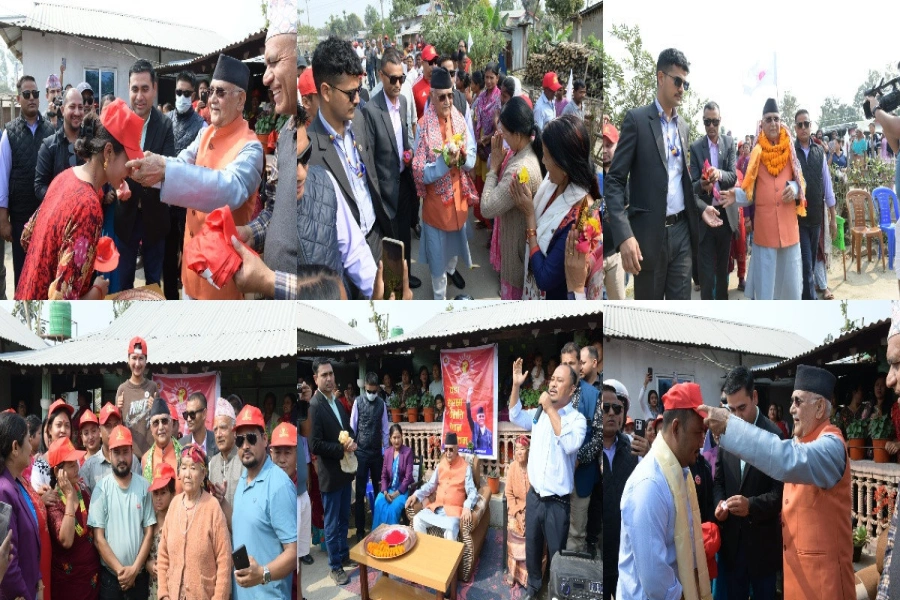KATHMANDU, Dec 6: Saudi Arabia's under-construction 'mega project' aimed at hosting the 2034 World Cup has exposed widespread labor exploitation of migrant workers.
Human Rights Watch, an international human rights organization, has revealed this fact through a research report. The report highlights the exploitation of workers from Nepal, Bangladesh, and India.
The 79-page report, titled "Die First, Then I’ll Pay You Later: Saudi Arabia: 'Giga-Projects' Built on Widespread Labor Abuses," describes numerous incidents of abuse against migrant workers, including cases of forced labor.
The report highlights issues such as high recruitment fees, widespread wage theft, inadequate safety measures to protect workers from intense heat, restrictions on the right to change jobs, and incidents of worker deaths. It also points out that the Saudi administration has been ineffective in ensuring proper treatment of workers at construction sites.
Michael Page, deputy director of the Middle East Division at Human Rights Watch, said, “Mega projects, with millions of dollars in investment, rely on the human labor of migrant workers. However, authorities widely violate their rights, and workers have no access to any form of legal remedy.”
Human Rights Watch prepared the report based on interviews with over 155 migrant workers who have previously worked or are currently working in various employment sectors and geographic areas, as well as with the families of deceased workers.
"Die first, then we'll pay"
Saudi Arabia sole bidder to host 2034 World Cup, FIFA says

The report also includes accounts from victimized workers and the families of deceased workers. One worker mentioned receiving his salary for the first two months on time, but never receiving it again after that. Quoting the migrant worker, the report states, "I received my salary for the first two months on time. After that, I never received it again." When he asked the manager about his salary, the manager reportedly said, "Die first, then we'll pay."
The report also mentions incidents where workers suffering in such conditions had to endure hardships in changing jobs or leaving Saudi Arabia. Human Rights Watch notes that these incidents are contrary to the labor reform initiatives implemented by Saudi Arabia in 2021.
A worker told Human Rights Watch, “I was told to obtain immigration permission. I was instructed to leave the country and come back through immigration to another company. However, the employer refused, saying that if they allowed you to change sponsors, other workers would have to be given the same opportunity."
The report also mentions that migrant workers face difficulties due to the lack of access to the internet and the lack of knowledge about understanding and managing employment contracts and services. It notes that under Saudi Arabia's labor laws, workers find it difficult to understand their rights and seek assistance through the Saudi administration or their own country's embassy.
The report mentions that employers continue to force workers to work in extreme heat, putting their lives at risk. As the rate of climate change increases, such dangers are likely to become even more severe. "Every day, one or two workers lose consciousness. Some faint while going to work, while others faint while working," a worker told Human Rights Watch. Working in extreme heat can harm health, and in some cases, it may lead to organ failure or other serious issues.
According to the data collected by Human Rights Watch from the Saudi government, 884 Bangladeshi workers have died between January and June 2024. The report notes that 80 percent of these deaths were due to natural causes.
The cause of death of migrant workers in Saudi Arabia is often not disclosed. Human Rights Watch states that no investigations are conducted, and compensation is not provided. As a result, the families of deceased workers are left to survive without financial assistance. As an example, the report includes a complaint from the wife of an Indian plumber who died.
"He had no health issues. We do not believe that his death was due to natural causes as stated on the death certificate," she said. "No proper investigation was conducted into the death."
Since her husband's death, she has been struggling to cover household expenses, children's school fees, and repay debts every month. "He used to send Rs 45,000 every month for all these expenses. But since he is no longer here, we are living in extreme hardship," she said.
Human Rights Watch has also spoken with seven Nepali workers in Saudi Arabia who are undergoing dialysis due to kidney failure while working. They are living out their final days. The wife of one of the patients told Human Rights Watch that the Nepal government is covering her husband's dialysis expenses.
"Yes, dialysis is ongoing, but I have no money to buy medicine, nor have I been able to pay my children's school fees," she said. "The Saudi company has not provided any assistance other than buying a ticket for me to return to Nepal."
Currently, there are 13.4 million migrant workers in Saudi Arabia, many of whom are employed in large construction sectors. With the progress of mega projects for the World Cup, this number is expected to rise further.
FIFA's negligence
Saudi Arabia has launched an ambitious mega project under its ‘Public Investment Fund,’ targeting the 2034 World Cup through investments from the ‘Sovereign Wealth Fund.’ So far, FIFA has not selected the host for the 2034 World Cup, but Saudi Arabia has made a strong bid for it.
Saudi Arabia has presented a construction plan to FIFA for the World Cup, which includes 11 new stadiums, renovations of four existing ones, over 185,000 new hotel rooms, airports, roads, and railways.
The FIFA conference scheduled for December 11 is expected to approve Saudi Arabia's construction project. However, Human Rights Watch has commented that it would not be advisable to allow Saudi Arabia to host an international football event without binding commitments, given its ongoing labor abuses.
Human Rights Watch stated that it informed FIFA about serious labor rights abuses related to Saudi Arabia's mega project in a letter on November 4. However, FIFA has not responded to the letter.







































